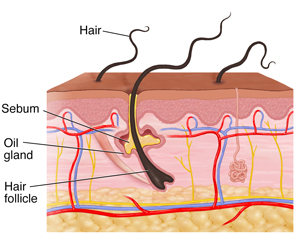Content
What Is Teen Acne?
Acne is a skin condition that causes blemishes on the face, back, neck, chest, buttocks, or upper arms. Having acne can be very upsetting. You may feel less attractive. And it may seem as though your skin will never clear up. In time, your acne may go away by itself. But treatment can help to control your acne now.
How you get acne
Acne starts inside the hair follicles under the surface of your skin. Oil glands that open into the hair follicles release too much oil (sebum). This is often due to hormonal changes. Sebum and skin cells then clog the tiny openings on your skin (pores). Bacteria can then get trapped in the follicles, leading to swelling and acne blemishes. Acne is not caused by the food you eat or drink—for example, chocolate or soda.
Types of acne
The 4 main types of acne blemishes are described below:
Whiteheads (closed comedones) are round, white, pus-filled blemishes that form when hair follicles become clogged and sealed over.
Blackheads (open comedones) are round, dark pits that form when a hair follicle is clogged but has an opening to the air.
Pimples are red, swollen bumps that form when plugged follicle walls break near the skin's surface.
Deep cysts are pus-filled pimples. They form when plugged follicle walls break deep within the skin. Acne cysts are often large and painful. In some cases, they also cause scars.
What your healthcare provider can do
Some teens see their healthcare provider for their acne because they are upset by the way their skin looks. Ask your provider about the best way to control your specific type of acne. It takes time for pimples that you already have to heal. But treatment helps prevent new blemishes and scars from forming. If no new blemishes form, no new scarring can occur. Medicines can and will improve your acne, but it often takes several months, not several days. If you stop taking the medicines, the acne will usually come back. Treatment options may include:
Medicines taken by mouth (orally)
Medicines applied to the skin (topical)
Physical removal of blemishes
Laser therapy or chemical peels
Surgical removal of acne scars
Make sure you understand your treatment plan. If you have any questions, ask your healthcare provider. You will play an important role in controlling your acne.


